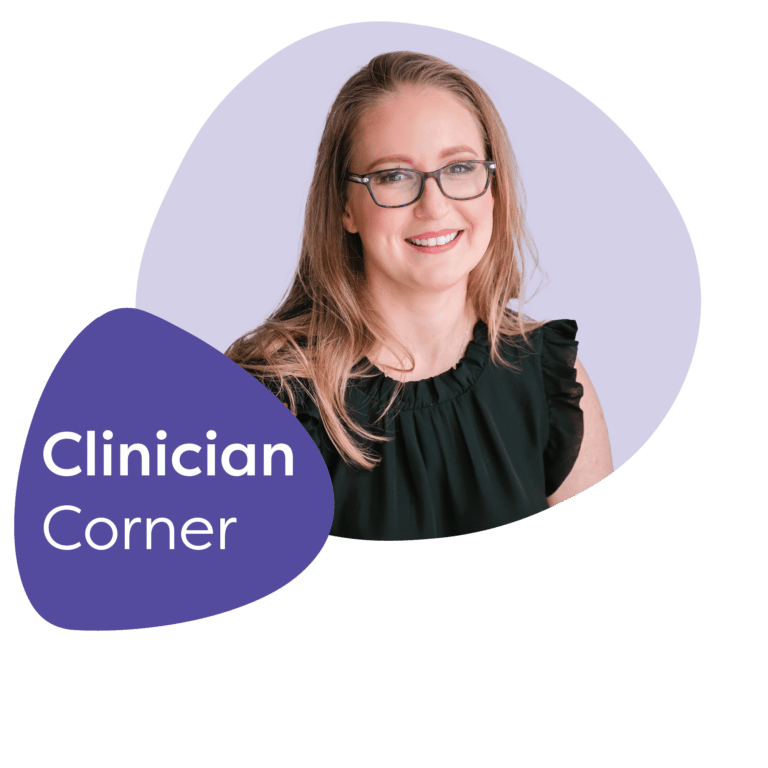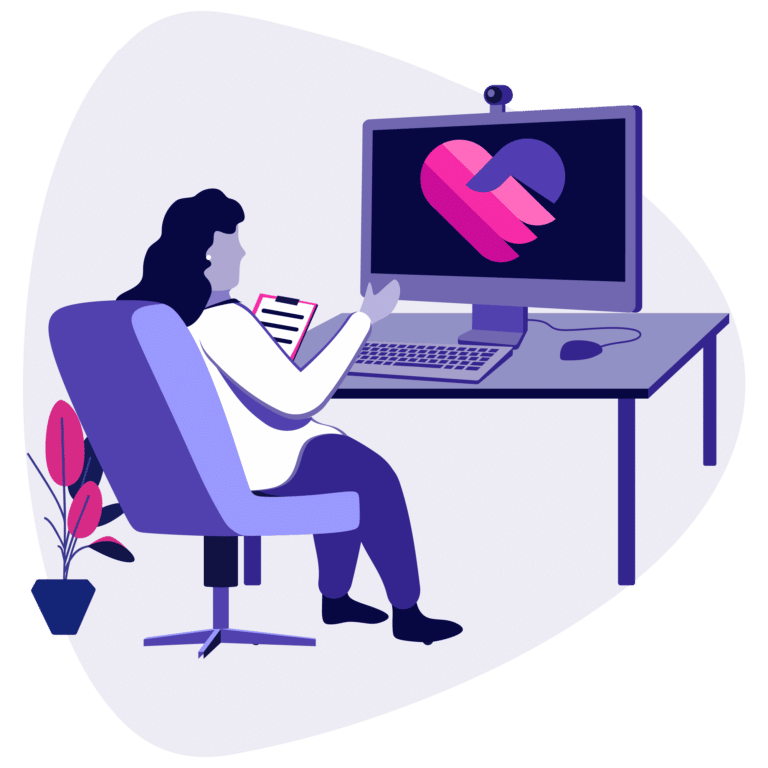Iris clinicians are at the heart of what makes our organization such a special place to work. That’s why we’re turning the spotlight on the amazing work they’re doing every day. This month, we’re sitting down to talk with Courtney Bearden.
Q. How did you find Iris and decide you wanted to be an Iris provider?
A: I found Iris by going on a nurse practitioner’s social media board. I searched “telepsych” because I knew that’s what I wanted to do. Of all the negative reviews and bad experiences people had with other companies, Iris was the only one that had universally good responses from my peers. I ended up meeting with several telehealth companies, and having done that background work, Iris was the clear-cut winner.
Q. What does a typical day as an Iris Telehealth provider look like for you?
A: Right now, I’m working with our on-demand services and doing a combination of night and day shifts. My day looks different day-to-day, but a typical day shift allows me to get up and take my kids to school in the morning, which is wonderful. Then, I have time to get back and make a cup of coffee. I see patients for the bulk of that day. It’s a combination of calling and doing doc-to-doc reports, seeing the patients, documenting, and some collateral phone calls.
Then, I’m done in time to go pick up my kids from school in the afternoon, which again is another really wonderful thing to be able to do. If I’ve got any leftover work, it’s mostly just answering emails, nothing major. I don’t spend after-work time doing charting because I do it as I see patents. With the nature of consult-liaison work, you can’t leave it until the next day. So, I’m always done when my shift is done, which is a really nice and big change of pace.
Q. How do you foster connection with patients virtually?
A: Connecting virtually is something I thought would be more difficult. I have done bits and pieces of telepsychiatry for the past ten years. So, it’s not a new platform, but many patients became first acquainted with it during the COVID-19 pandemic. While there were certainly patients who were concerned about it, I found that I could connect just as well with a patient in person versus over telepsychiatry. There are things you can do as a provider that make a difference. The way you have your screen set up is important. For example, my camera is attached to the screen that I do my charting on. I’m looking at the patient while I’m charting, so I can continue having that eye contact and constant connection.
I will say that I feel like I’m better able to connect with certain age groups over a screen than in person, especially younger generations. That’s how they’re used to socializing and connecting. I do find that teenagers, in particular, tend to open up more over a screen, and I think it’s a generational thing. Still, it certainly surprised me when I found I was getting more from patients through telepsychiatry than in person, when patients tend to be a little more closed off.
Q. As a healthcare professional, how do you manage work-life balance?
A: A big part of managing work-life balance is finding the right company to work for. There are certainly healthcare organizations that do not prioritize clinician health. They do not prioritize clinician work-life balance. That’s obvious when you see schedules with 10-minute follow-ups, no charting time, and 30-minute initial evaluations. When you see something like that, it’s a very clear indicator that the priority for that organization is their bottom line. It’s profit. It’s seeing as many patients as quickly as you possibly can. The priority is not client care, and it’s certainly not clinician care. So, finding the right organization to work with makes a huge difference.
I can have a fairly easy work-life balance because I don’t have to see patients quickly, right after another. I have 30-minutes for follow-ups and 60-minutes for initial evaluations. I can see my patients, do any collateral calls, and do my charting within that time block. Then, at the end of the day, I’m done.
Q. What are your biggest learnings from your time at Iris?
A: The thing I’ve learned the most about is that there isn’t one way for a company to support their clinicians and their patients. We’re raised as healthcare professionals in the idea that you have to do things fast and only worry about if you can bill for it. We’re taught that this approach is normal and it’s not. Working for an organization that prioritizes patient care and prioritizes their clinicians was eye-opening. I came from a background in community mental health. It wasn’t a for-profit, private practice environment that I came from – it was from public health. So even with that background, learning that there was a different way it could be done was eye-opening for me.
Q. What is the most rewarding part of your job?
A: The most rewarding part of my job is when I see a patient, and at the end of our appointment, they say, “thank you, that was the first time anyone has really listened,” or “you’ve asked more questions than anyone ever has before.” That’s reassuring to know that we’re doing something right. Then, when our clinic partners, the ER physicians, or social workers thank you for coming in and taking that piece of the patient care. If they wanted to be psychiatrists, they would have been psychiatrists. There’s a reason why they’re consulting with us. It’s because we’re specialists and have a passion for something that they don’t. That is rewarding when you get appreciation from your colleagues and certainly from patients.
Q. What do you love about working with Iris?
A: The thing I love most about working with Iris is that it does feel like a team approach, and you’re not just an interchangeable peg that can plug into any situation. When they place you with a clinic or a partner, it’s a very long process. When you’re first starting, you can feel like, “Oh my gosh, why does this take so long?” It’s because they’re finding the right fit. It’s not a locum’s company where they’re not making intentional matches.
When you’re with Iris, it’s an intentional placement. And they don’t hire everyone who applies. It’s less than 10%. You know that you’ve been selected for a placement that will be a good fit for you.
Q. How does telepsychiatry open up access to care?
A: When COVID was forcing many people into working remotely or in a telehealth situation for the first time, there was a lot of hesitancy from both providers and patients. I think having been exposed now to that technology and the ability to have care delivered that way; there’s no going back. I don’t think we can close the floodgates. Even as a patient, I don’t think I ever want to go into a primary care office in person again unless I have to.
It’s really convenient to have access to care at home and to care for patients who don’t have transportation, which was always a barrier – especially in rural health care. Not having to find a ride two hours into a town where the clinic is located is great. It has opened care to people who weren’t getting it before. This is how we’ll continue to provide care to people who need care. This is how we will do things from here on out.
Q. Why do you think telepsychiatry is important to the future of mental healthcare?
A: Telepsychiatry is going to be integral and continues to be integral for mental health care because there are not enough mental health clinicians. There certainly aren’t enough to have one provider in every single rural role and underserved community in America. We’re able to see patients in many different settings and spread that expertise and spread that knowledge to people who may not otherwise have any access to care.
A good example is the work I do with consult liaison. In a consult liaison role, I see patients in eight states and many different settings. There can’t be a psychiatric nurse practitioner or a psychiatrist on site in every one of those hospitals, 24/7. But, with Iris and with our on-demand services, there is. There’s essentially a mental health specialist in every clinic and hospital, 24/7, 365. There’s no way to do it without the use of telehealth. And, it’s a real disservice to patients not to have access to that level of specialized care.
At Iris, we believe our providers should be respected, valued, and applauded for the work they do, and we couldn’t be more proud to say, “thank you” to our very own Courtney Bearden. If you’d like to learn more about working for Iris Telehealth, contact us today.

